At a time of rising tensions between their countries, people in the United States and Germany express increasingly divergent views about the status of their decades-long partnership. They are divided not only on the overall state of the relationship, but also on future levels of cooperation, the importance they ascribe to each other on foreign policy and the efficacy of retaliatory tariffs. Despite these differences, people in the U.S. and Germany still find common ground on the benefits of free trade, the importance of NATO and the continued need to spend on defense, according to surveys conducted in the U.S. by Pew Research Center and in Germany by the Körber-Stiftung in September 2018. (Note: More detailed survey results were published in this report March 4, 2019.)
Here are seven charts that explain the status of this complicated relationship:
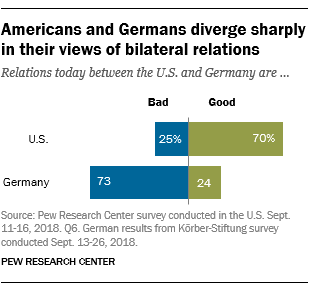 1Americans and Germans are worlds apart on the overall state of their relationship. In the U.S., seven-in-ten say the relationship is good, while 73% in Germany say the relationship is bad. Among Germans, this constitutes a sharp elevation in negative assessments since 2017, when 56% said the relationship was bad.
1Americans and Germans are worlds apart on the overall state of their relationship. In the U.S., seven-in-ten say the relationship is good, while 73% in Germany say the relationship is bad. Among Germans, this constitutes a sharp elevation in negative assessments since 2017, when 56% said the relationship was bad.
Despite their generally negative perceptions, only one-in-ten Germans say the relationship with the U.S. is very bad. Most Americans (58%), for their part, say the relationship is somewhat good, while a far smaller share (12%) say it is very good.
2Seven-in-ten Americans say the U.S. should cooperate more with Germany, but only 41% of Germans say Germany should cooperate more with the U.S. German views on this question have become more negative in the past year: In 2017, a 56% majority of Germans said they should collaborate more with the U.S.
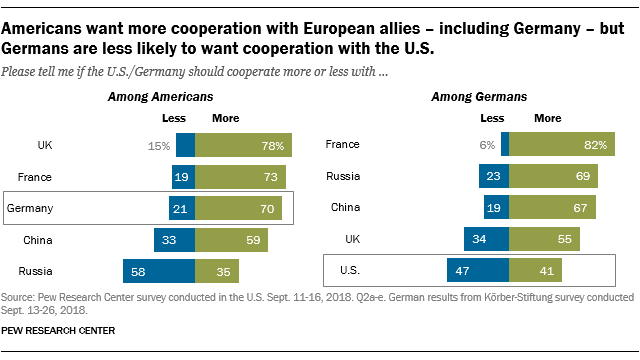 When asked about cooperation with other major powers, Americans and Germans generally agree that their countries should cooperate more with France, the United Kingdom and China. But when it comes to Russia, people in the U.S. and Germany sharply diverge. A majority of Americans (58%) want to cooperate less with their Cold War adversary, while nearly seven-in-ten Germans (69%) want to cooperate more with Russia, the source of about a third of Germany’s natural gas imports as of 2015.
When asked about cooperation with other major powers, Americans and Germans generally agree that their countries should cooperate more with France, the United Kingdom and China. But when it comes to Russia, people in the U.S. and Germany sharply diverge. A majority of Americans (58%) want to cooperate less with their Cold War adversary, while nearly seven-in-ten Germans (69%) want to cooperate more with Russia, the source of about a third of Germany’s natural gas imports as of 2015.
3Few Americans name Germany as their country’s most or second-most important foreign policy partner, but about a third of Germans name the U.S. Only 9% in the U.S. name Germany as one of their top two foreign affairs partners, far fewer than the 37% who name the UK and 26% who name China. Since 2017 the share of Americans saying Canada is their country’s first- or second-priority partner has increased to 25%. In fact, Germany is no longer among the top five countries cited by Americans.
In Germany, most people (61%) continue to identify France as the most or second-most important foreign policy partner, while 35% mention the U.S. That’s down from 43% in 2017.
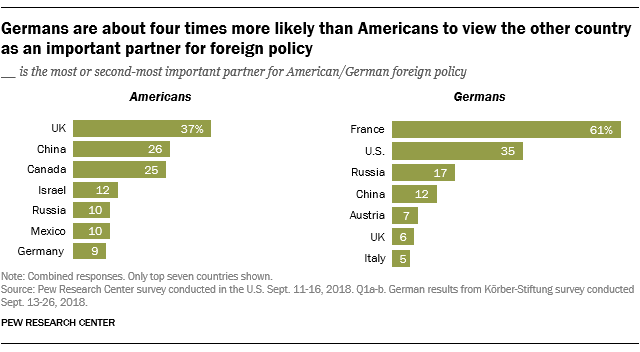
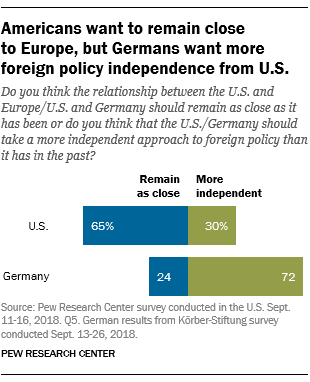 4Most Germans want to be more independent from the U.S. on foreign policy, but most Americans want to remain close with Europe. A wide majority of Germans (72%) say they want their country to be more independent from the U.S. on foreign policy, while about a quarter (24%) want it to remain as close to the U.S. as it has been. In the U.S., roughly two-thirds of Americans (65%) want to remain close with Europe, rather than be more independent on foreign policy (30%).
4Most Germans want to be more independent from the U.S. on foreign policy, but most Americans want to remain close with Europe. A wide majority of Germans (72%) say they want their country to be more independent from the U.S. on foreign policy, while about a quarter (24%) want it to remain as close to the U.S. as it has been. In the U.S., roughly two-thirds of Americans (65%) want to remain close with Europe, rather than be more independent on foreign policy (30%).
Views in the U.S. on independence or closeness to Europe are similar to when the question was asked over a decade ago.
5American and German views on defense spending are generally similar, but there have been notable shifts in opinion in both countries over the last year. Americans have become less likely to say European allies should increase spending on national defense (39% hold this view this year, down from 45% in 2017). Meanwhile, Germans have become more likely to say their country should increase defense spending (43% have this opinion this year, up from 32% in 2017).
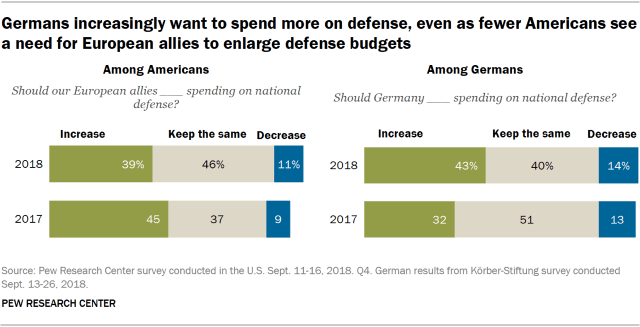
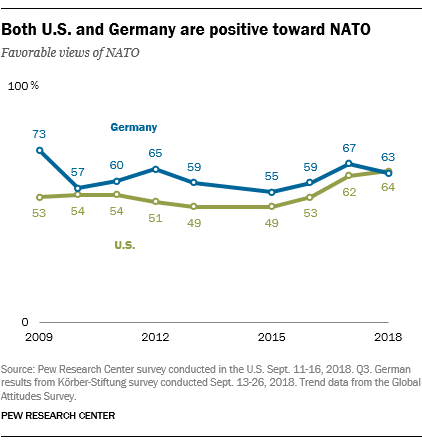 6Americans and Germans clearly align on NATO. Nearly identical percentages of Americans (64%) and Germans (63%) have favorable views of the organization. Moreover, German and American opinions have largely moved in tandem – and remained favorable – since this question was first asked in 2009.
6Americans and Germans clearly align on NATO. Nearly identical percentages of Americans (64%) and Germans (63%) have favorable views of the organization. Moreover, German and American opinions have largely moved in tandem – and remained favorable – since this question was first asked in 2009.
7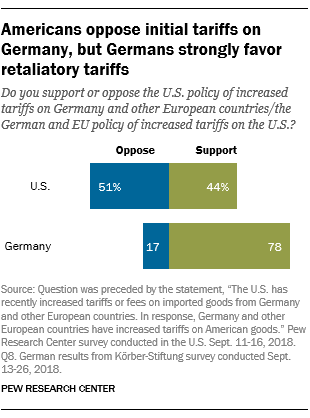 Americans and Germans have different views toward tariffs. In June 2018, the Trump administration’s tariffs on European steel and aluminum went into effect. In response, Germany and its European Union allies placed tariffs on American goods, ranging from bourbon to motorcycles. In the U.S., more Americans oppose than support the initial tariffs imposed on German and other EU products (51% vs. 44%). Germans, however, support retaliatory tariffs by a large margin: Nearly eight-in-ten (78%) support increasing tariffs on imported U.S. products in response to American tariffs on German goods.
Americans and Germans have different views toward tariffs. In June 2018, the Trump administration’s tariffs on European steel and aluminum went into effect. In response, Germany and its European Union allies placed tariffs on American goods, ranging from bourbon to motorcycles. In the U.S., more Americans oppose than support the initial tariffs imposed on German and other EU products (51% vs. 44%). Germans, however, support retaliatory tariffs by a large margin: Nearly eight-in-ten (78%) support increasing tariffs on imported U.S. products in response to American tariffs on German goods.
Even with the backdrop of tense trade relations between the two countries, people in both nations continue to share similar values regarding the benefits of free trade. Most Americans (68%) and Germans (53%) think free trade is beneficial for them personally. And overwhelming majorities in both countries continue to say that growing trade and business ties with other nations is good for their country.
Note: See full U.S. topline results and methodology here (PDF). More detailed results from these surveys were published in this report March 4, 2019.




